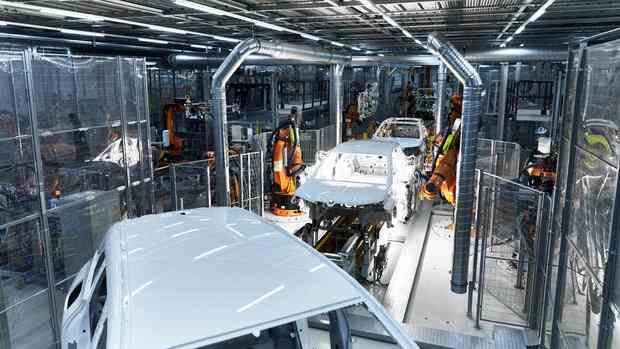The automotive industry wants to network more closely digitally – also for reasons of sustainability.
(Photo: BMW)
Munich The German automotive industry wants to network more closely digitally. In the future, the Catena-X cloud platform will digitally map the entire value chain. It should help, for example, to determine the CO2 emissions in the production of a vehicle. But the consumption of raw materials should also become more efficient.
The project is now taking shape with the establishment of a first joint venture between BASF, BMW, Henkel, Mercedes, SAP, Schaeffler, Siemens, T-Systems, Volkswagen and ZF. The operating company, called Cofinity-X, is to offer products and services for the secure exchange of data along the production chain. Various companies with various systems are involved in the .
“The joint venture helps us to achieve sustainability and efficiency goals in the automotive industry faster and more efficiently,” said Siemens Cedrik Neike, board member for industry on Tuesday. To do this, car manufacturers, suppliers and outfitters would have to work together.
The overview of the data often ends at the factory gate
A major theme of the initiative is sustainability. The digital platform is intended to facilitate entry into the circular economy, for example. The increasing requirements for traceability of all materials is one of the key factors for Cofinity-X, said Alexander Schleicher, Managing Director of the new project.
The exchange of data has not been easy so far. Every group has its own network of suppliers, including their own IT systems and data standards. The overview therefore often ends at the factory gate, at the latest with the direct supplier. In addition, many companies are reluctant to share too much data with other companies.
>> Read also: Industrial Metaverse – “We need to reprogram the machines much faster”
The cloud platform is intended to create the infrastructure to facilitate data exchange. “The data stays with the company,” said Oliver Ganser, who heads the “Data Driven Value Chain” program at BMW. A set of rules should ensure data sovereignty.
In the future, for example, a data portal should provide a precise overview of which components are installed in a vehicle for the circular economy with the help of data from suppliers. This extends to the raw materials that are processed in the battery.
When a car is taken out of service, manufacturers, suppliers and recycling companies should receive precise information about the raw materials and components used via Catena-X. The recycling rate, according to Catena-X it is currently 20 percent, could increase significantly as a result.
First products and services available from the end of April
The new operating company Cofinity-X now wants to provide small and medium-sized suppliers in particular with easy access to the Catena-X data ecosystem. The first products and services should be available from the end of April.
Catena-X is nominally part of Gaia-X, the European project for building a digital infrastructure. Their goal is technical sovereignty. In this context, the consortium is receiving state support: According to earlier information, the funding amounts to 105 million euros, which will go to the companies investing in the development.
In terms of technical development, however, Catena-X does not need the support of Gaia-X. An open source component is used for data exchange, which the Fraunhofer-Gesellschaft was responsible for developing – the software that is to be created as part of the European project is not yet ready for use.
More: Which digital future projects the federal government wants to support
